冀教版英语九年级全册Unit 8 Lesson 45 Different Manners课件+嵌入音频(共26张PPT)
文档属性
| 名称 | 冀教版英语九年级全册Unit 8 Lesson 45 Different Manners课件+嵌入音频(共26张PPT) | 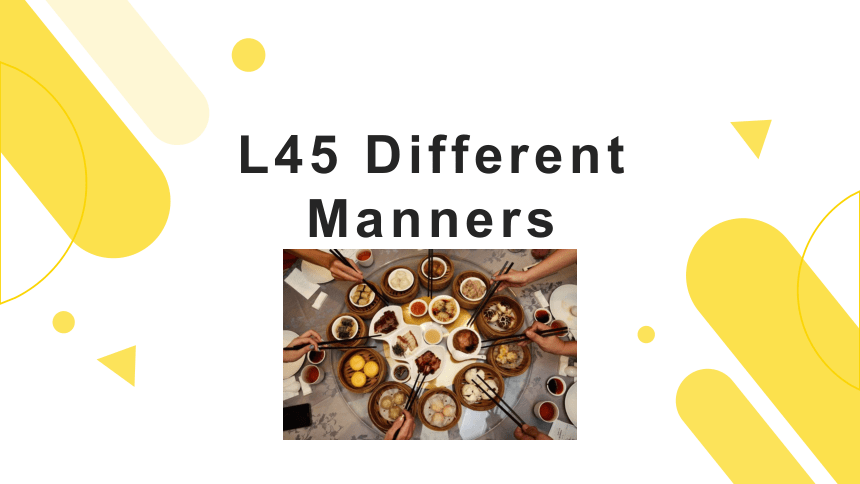 | |
| 格式 | zip | ||
| 文件大小 | 1.9MB | ||
| 资源类型 | 教案 | ||
| 版本资源 | 冀教版 | ||
| 科目 | 英语 | ||
| 更新时间 | 2021-12-16 14:06:39 | ||
图片预览

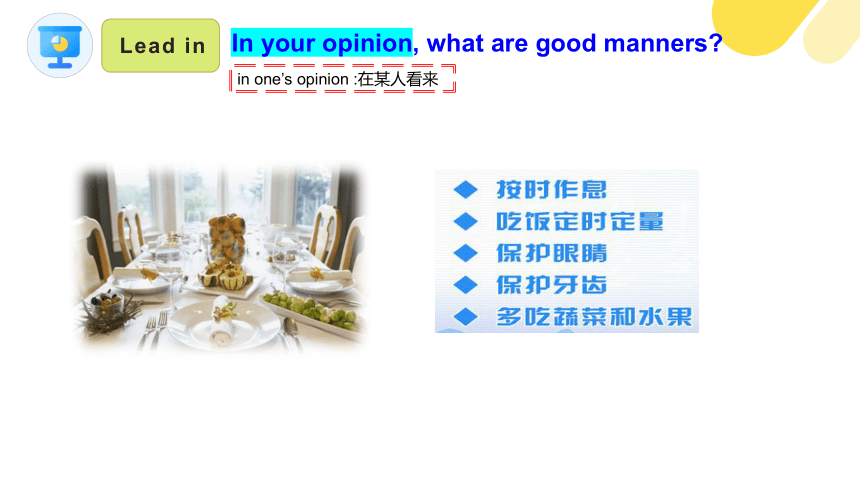
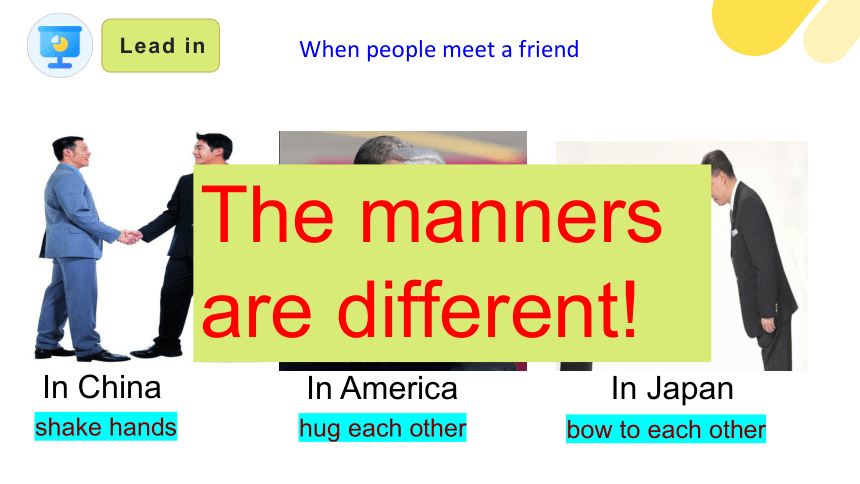
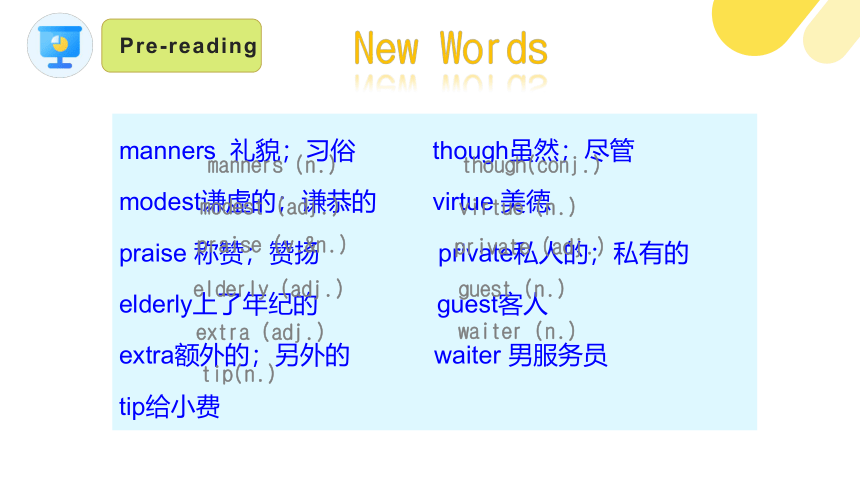
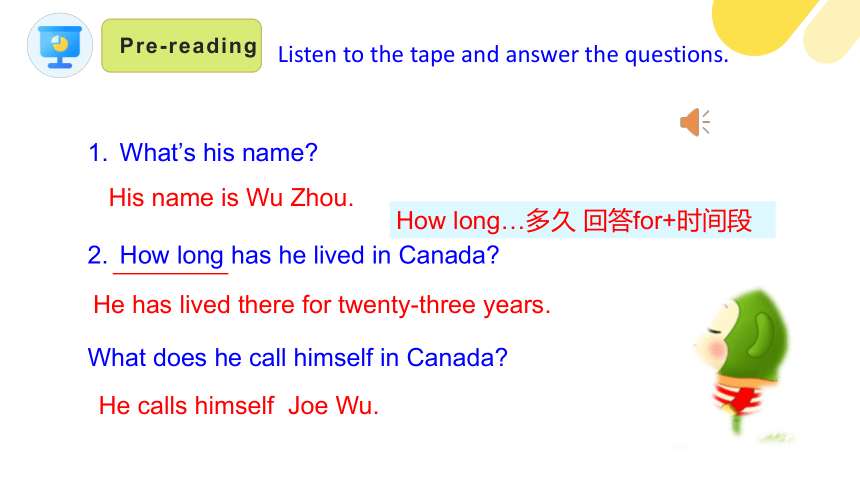
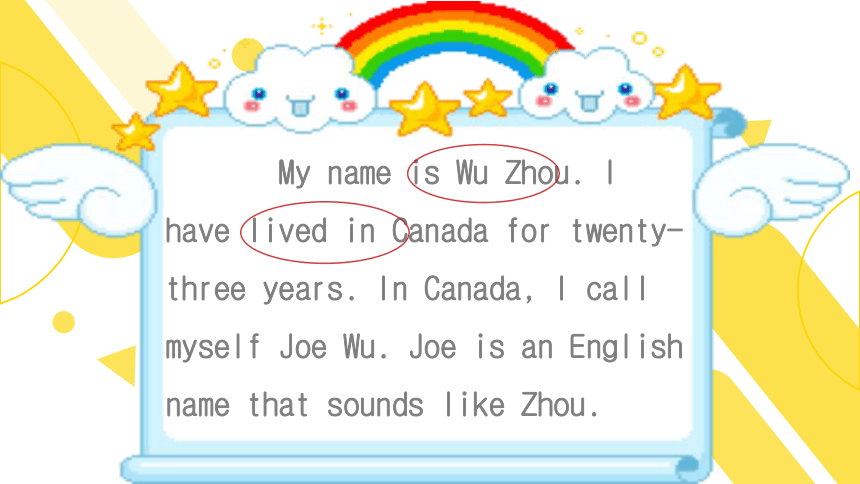
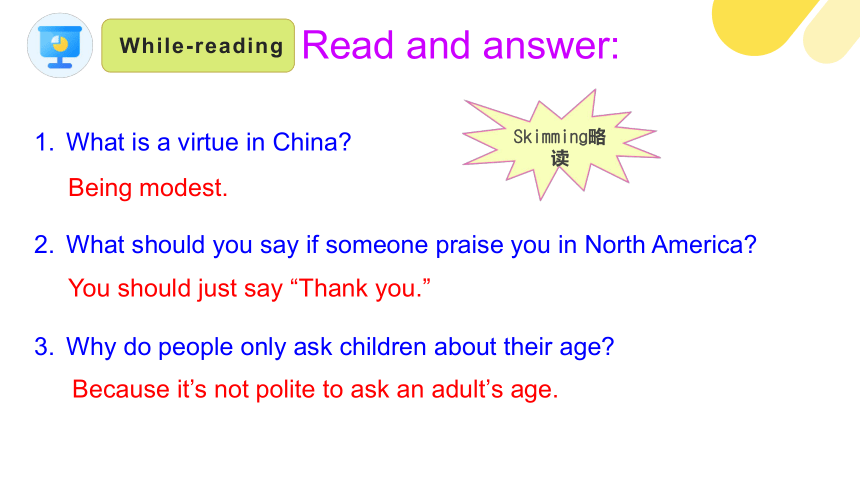
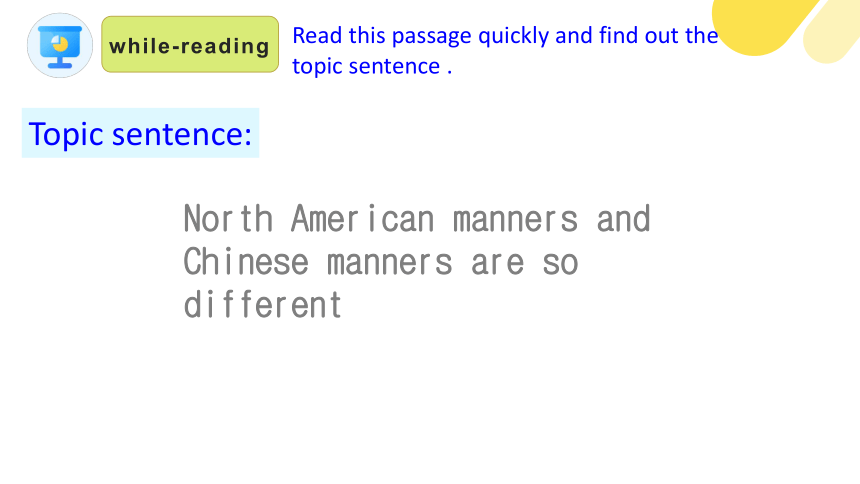
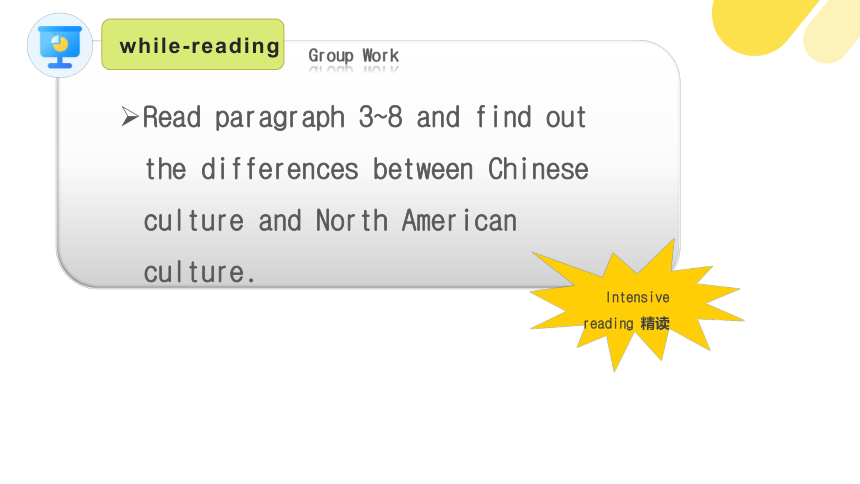
文档简介
(共26张PPT)
L45 Different Manners
Lead in
In your opinion, what are good manners
in one’s opinion :在某人看来
In China
shake hands
When people meet a friend
In America
In Japan
hug each other
bow to each other
Lead in
The manners are different!
manners 礼貌;习俗 though虽然;尽管
modest谦虚的;谦恭的 virtue 美德
praise 称赞;赞扬 private私人的;私有的
elderly上了年纪的 guest客人
extra额外的;另外的 waiter 男服务员
tip给小费
manners (n.)
New Words
modest (adj.)
praise (v.&n.)
virtue (n.)
though(conj.)
elderly (adj.)
private (adj.)
waiter (n.)
extra (adj.)
guest (n.)
tip(n.)
Pre-reading
Pre-reading
Listen to the tape and answer the questions.
What’s his name
How long has he lived in Canada
What does he call himself in Canada
His name is Wu Zhou.
He has lived there for twenty-three years.
He calls himself Joe Wu.
How long…多久 回答for+时间段
My name is Wu Zhou. I have lived in Canada for twenty-three years. In Canada, I call myself Joe Wu. Joe is an English name that sounds like Zhou.
What is a virtue in China
What should you say if someone praise you in North America
Why do people only ask children about their age
Being modest.
You should just say “Thank you.”
Because it’s not polite to ask an adult’s age.
Skimming略读
While-reading
Read and answer:
Read this passage quickly and find out the topic sentence .
Topic sentence:
North American manners and Chinese manners are so different
while-reading
Group Work
Intensive reading 精读
Read paragraph 3~8 and find out the differences between Chinese culture and North American culture.
while-reading
In China, being modest is a virtue. If someone praises you and says that your English is excellent, you should be modest and say,” No, no. My English is still poor.” But in North America, this is usually a sign of being weak and not confident. You should just say,” Thank you.”
Para3
modesty & confidence
while-reading
being praised
In Canada, people only ask children about their age. It’s not polite to ask an adult’s age. They think it is private. But this is common in many places in China.
Para4
It’s polite to do……
while-reading
asking ages
private-privacy
3. It’s not polite to ask an adult’s age.问成年人的年龄是不礼貌的。
It’s not polite to do sth. 做……是不礼貌的。例如:
It is not polite to stare at others.
盯着别人看是一种不礼貌的行为。
In both China and North America, it is polite to offer an elderly person a seat on the bus. In North America, however, an elderly person may feel embarrassed about being offered a seat.
Para5
while-reading
offering a seat
both …and……
4. In both China and North America, it is polite to offer an elderly person a seat on the bus.在中国和北美,在公共汽车上给老人让座是礼貌的。
both...and...“两者都……”,连接名词或代词作主语时
谓语动词用复数形式,不受‘就近原则’的限制。例如:
Both Li Ming and Wei Hua are good at English.
李明和魏华都擅长英语。
In both China and North America, it is polite to offer an elderly person a seat on the bus. In North America, however, an elderly person may feel embarrassed about being offered a seat.
Para6
while-reading
offering a seat
both …and……
When Chinese people eat out in restaurants, they may take turns paying for the meal. In Canada, however, people often share the cost of a meal.
Para6
while-reading
paying for meals
take turns doing
轮流做某事
. When Chinese people eat out in restaurants, they may take turns paying for the meal.当中国人在餐馆吃饭时,他们可能轮流付钱。
take turns doing sth. 轮流做某事,表示的是已发生并将
继续发生的情形。例如:
Susan and her brother take turns washing the dishes.
苏珊和她弟弟轮流洗盘子。
We take turns cleaning the classroom.
我们轮流打扫教室。
They took turns taking photos yesterday.
他们昨天轮流拍照。
In China, if your guests have no food on their plates, it’s polite to put food on their plates. In Canada, you pass food to guests, but you don’t usually put food on their plates.
Para7
while-reading
having meals with guests
pass sth to sb
递给某人某物
In China, people seldom give extra money to waiters, waitress, taxi drivers or hotel workers. In North America, this is always done. It is called “tipping”.
Para8
while-reading
giving tips
extra money
额外的钱
Different Manners
China Canada
being praised should be modest
asking ages children’s or adults’
offering a seat is polite but the elder will feel embarrassed
having meals with guests pass food to guests
paying for meals take turns
giving tips always
post-reading
It’s interesting to experience two different cultures. I think understanding cultural differences really helps us to understand each other, live together and work together.
post-reading
What have you learned in this class
Reading skills
Cultural differences
Summary
Language points
I. 用所给单词的适当形式填空
1. I ___________(live) in this city for a long time.
2. _________(be) modest is a virtue in our country.
3. It’s not polite to ask an _________ (adult) age in Western countries.
4. Both Li Ming and Jenny ________(speak) English well.
5. The students in our class take turns _________(clean) the blackboard.
have lived
Being
adult’s
speak
cleaning
Review the lesson.
Write down your ideas about cultural
difference. (around 60 words)
Homework
When in Rome, do as the Romans do!
入乡随俗!
Have a nice day!
L45 Different Manners
Lead in
In your opinion, what are good manners
in one’s opinion :在某人看来
In China
shake hands
When people meet a friend
In America
In Japan
hug each other
bow to each other
Lead in
The manners are different!
manners 礼貌;习俗 though虽然;尽管
modest谦虚的;谦恭的 virtue 美德
praise 称赞;赞扬 private私人的;私有的
elderly上了年纪的 guest客人
extra额外的;另外的 waiter 男服务员
tip给小费
manners (n.)
New Words
modest (adj.)
praise (v.&n.)
virtue (n.)
though(conj.)
elderly (adj.)
private (adj.)
waiter (n.)
extra (adj.)
guest (n.)
tip(n.)
Pre-reading
Pre-reading
Listen to the tape and answer the questions.
What’s his name
How long has he lived in Canada
What does he call himself in Canada
His name is Wu Zhou.
He has lived there for twenty-three years.
He calls himself Joe Wu.
How long…多久 回答for+时间段
My name is Wu Zhou. I have lived in Canada for twenty-three years. In Canada, I call myself Joe Wu. Joe is an English name that sounds like Zhou.
What is a virtue in China
What should you say if someone praise you in North America
Why do people only ask children about their age
Being modest.
You should just say “Thank you.”
Because it’s not polite to ask an adult’s age.
Skimming略读
While-reading
Read and answer:
Read this passage quickly and find out the topic sentence .
Topic sentence:
North American manners and Chinese manners are so different
while-reading
Group Work
Intensive reading 精读
Read paragraph 3~8 and find out the differences between Chinese culture and North American culture.
while-reading
In China, being modest is a virtue. If someone praises you and says that your English is excellent, you should be modest and say,” No, no. My English is still poor.” But in North America, this is usually a sign of being weak and not confident. You should just say,” Thank you.”
Para3
modesty & confidence
while-reading
being praised
In Canada, people only ask children about their age. It’s not polite to ask an adult’s age. They think it is private. But this is common in many places in China.
Para4
It’s polite to do……
while-reading
asking ages
private-privacy
3. It’s not polite to ask an adult’s age.问成年人的年龄是不礼貌的。
It’s not polite to do sth. 做……是不礼貌的。例如:
It is not polite to stare at others.
盯着别人看是一种不礼貌的行为。
In both China and North America, it is polite to offer an elderly person a seat on the bus. In North America, however, an elderly person may feel embarrassed about being offered a seat.
Para5
while-reading
offering a seat
both …and……
4. In both China and North America, it is polite to offer an elderly person a seat on the bus.在中国和北美,在公共汽车上给老人让座是礼貌的。
both...and...“两者都……”,连接名词或代词作主语时
谓语动词用复数形式,不受‘就近原则’的限制。例如:
Both Li Ming and Wei Hua are good at English.
李明和魏华都擅长英语。
In both China and North America, it is polite to offer an elderly person a seat on the bus. In North America, however, an elderly person may feel embarrassed about being offered a seat.
Para6
while-reading
offering a seat
both …and……
When Chinese people eat out in restaurants, they may take turns paying for the meal. In Canada, however, people often share the cost of a meal.
Para6
while-reading
paying for meals
take turns doing
轮流做某事
. When Chinese people eat out in restaurants, they may take turns paying for the meal.当中国人在餐馆吃饭时,他们可能轮流付钱。
take turns doing sth. 轮流做某事,表示的是已发生并将
继续发生的情形。例如:
Susan and her brother take turns washing the dishes.
苏珊和她弟弟轮流洗盘子。
We take turns cleaning the classroom.
我们轮流打扫教室。
They took turns taking photos yesterday.
他们昨天轮流拍照。
In China, if your guests have no food on their plates, it’s polite to put food on their plates. In Canada, you pass food to guests, but you don’t usually put food on their plates.
Para7
while-reading
having meals with guests
pass sth to sb
递给某人某物
In China, people seldom give extra money to waiters, waitress, taxi drivers or hotel workers. In North America, this is always done. It is called “tipping”.
Para8
while-reading
giving tips
extra money
额外的钱
Different Manners
China Canada
being praised should be modest
asking ages children’s or adults’
offering a seat is polite but the elder will feel embarrassed
having meals with guests pass food to guests
paying for meals take turns
giving tips always
post-reading
It’s interesting to experience two different cultures. I think understanding cultural differences really helps us to understand each other, live together and work together.
post-reading
What have you learned in this class
Reading skills
Cultural differences
Summary
Language points
I. 用所给单词的适当形式填空
1. I ___________(live) in this city for a long time.
2. _________(be) modest is a virtue in our country.
3. It’s not polite to ask an _________ (adult) age in Western countries.
4. Both Li Ming and Jenny ________(speak) English well.
5. The students in our class take turns _________(clean) the blackboard.
have lived
Being
adult’s
speak
cleaning
Review the lesson.
Write down your ideas about cultural
difference. (around 60 words)
Homework
When in Rome, do as the Romans do!
入乡随俗!
Have a nice day!
同课章节目录
- Unit 7 Work for Peace
- Lesson 37 Don't Fight!
- Lesson 38 Making School a Better Place
- Lesson 39 The Dove and the Olive Branch
- Lesson 40 The UN—Power of Words
- Lesson 41 Jenny's Good Advice
- Lesson 42 Peace at Last
- Unit Review
- Unit 8 Culture Shapes Us
- Lesson 43 A Visit to Chinatown
- Lesson 44 Popular Sayings
- Lesson 45 Different Manners
- Lesson 46 Home to Many Cultures
- Lesson 47 Good Manners
- Lesson 48 Supper with the Bradshaws
- Unit Review
- Unit 9 Communication
- Lesson 49 Get Along with Others
- Lesson 50 Tips for Good Communication
- Lesson 51 What Could Be Wrong?
- Lesson 52 The Power of a Smile
- Lesson 53 Working in Groups
- Lesson 54 How Embarrassing!
- Unit Review
- Unit 10 Get Ready for the Future
- Lesson 55 Look into the Future
- Lesson 56 Manage Your Time
- Lesson 57 Best Wishes
- Lesson 58 Ms.Liu's Speech
- Lesson 59 Keep Your Choices Open
- Lesson 60 Get a Good Education
- Unit Review
